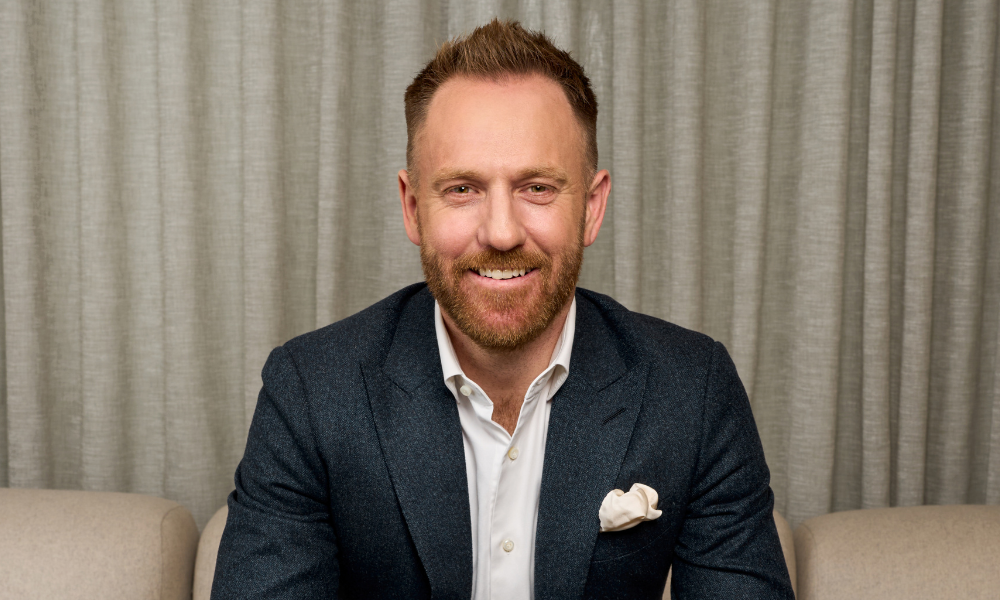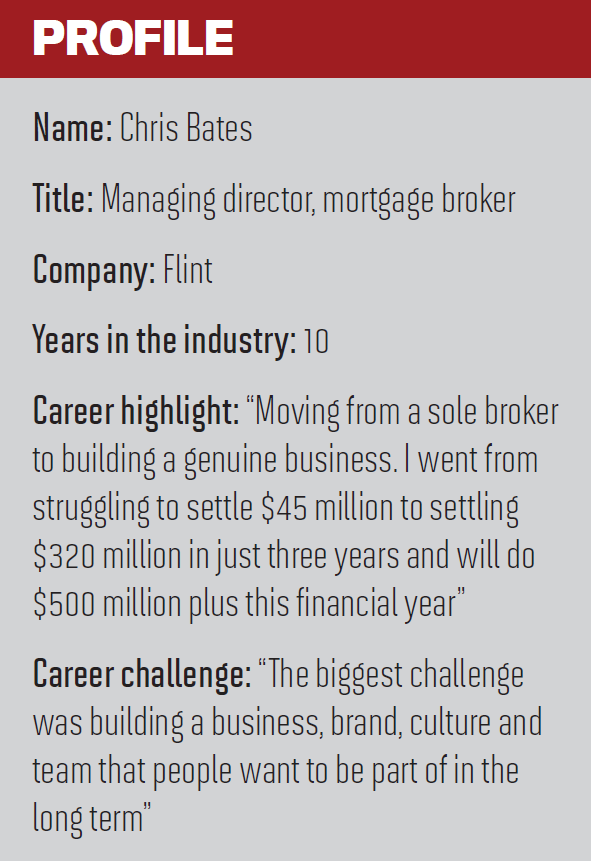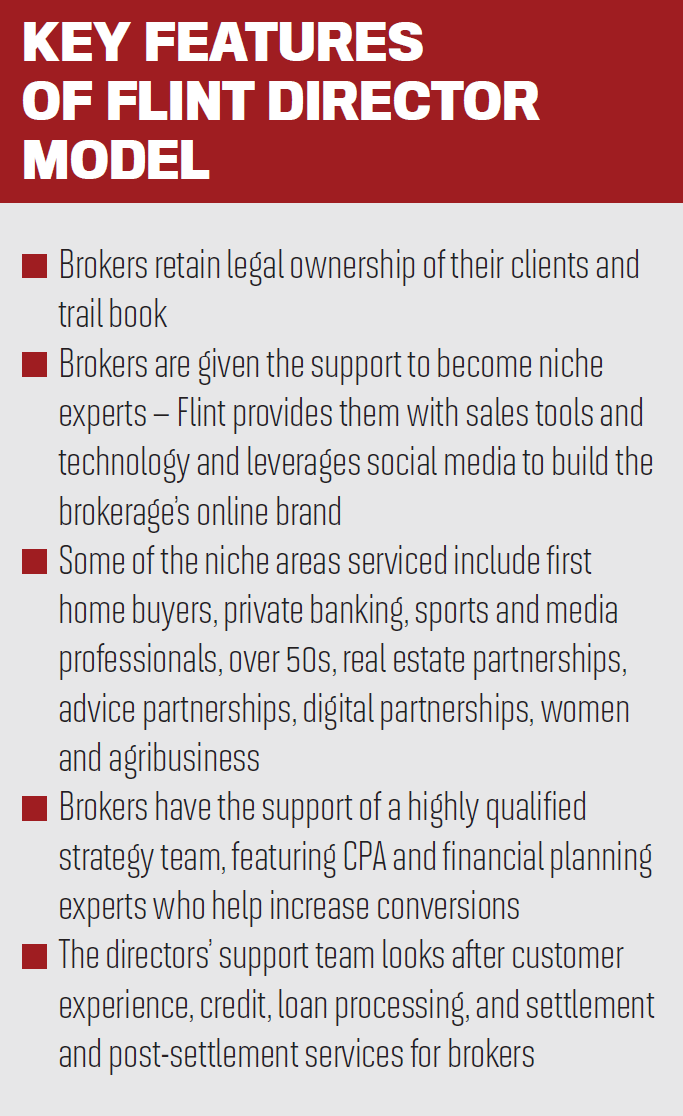New type of brokerage supports success and ownership

Note: Chris Bates has since left Flint
Award-winning mortgage broker Chris Bates has a vision: to develop brokers into niche experts who are equipped with the tools to reach their true potential and can retain control over their own businesses.
Bates, who has featured in MPA’s Top 100 Brokers list in the last four years – 2020, 2021, 2022, 2023 – and this year too, is the managing director of financial services brokerage Flint. He and Flint CEO Christian Stevens launched the business in February 2024 with a focus on providing an extensive range of lending solutions, superior technology, and a unique business model that puts the broker in the driver’s seat.
Bates has been in the mortgage industry for a decade and says his first five years as a broker were very difficult.
“The first five years were incredibly tough; I only settled $130 million,” Bates says. “Even after having seven years as a financial adviser and knowing how to sell advice, the transition to building an excellent mortgage brokerage is much more complicated than anyone believes.
“There are enormous challenges in building a talented team and driving efficiency while maintaining profitability and a trusted engine required to scale up.”
 Bates started Blusk, a joint financial advice and mortgage broking business, in 2014, partnering with Ben Sum, who is now an owner of Flint alongside Bates and Stevens. The pair sold the financial advice division of Blusk in 2020 to focus on mortgage structuring, helping higher-income Australians with complex property strategies.
Bates started Blusk, a joint financial advice and mortgage broking business, in 2014, partnering with Ben Sum, who is now an owner of Flint alongside Bates and Stevens. The pair sold the financial advice division of Blusk in 2020 to focus on mortgage structuring, helping higher-income Australians with complex property strategies.
“We learnt many lessons and settled over $1.4 billion,” says Bates. “More importantly, we built an engine and process required to scale.” Among the lessons learnt were how to deliver great client experiences by providing quality advice and building a solid reputation in a target market. These strategies came in handy when Bates and Stevens met in 2019 and eventually formed a partnership five years later.
“We openly shared learnings, debated our plans and celebrated each other’s success,” says Bates.
 He and Stevens discussed creating something more significant. “We knew the future of broking needed a much bigger team and investment in consumer-leading technology to thrive in the digital revolution of broking.”
He and Stevens discussed creating something more significant. “We knew the future of broking needed a much bigger team and investment in consumer-leading technology to thrive in the digital revolution of broking.”
Realising that their strengths, as well as those of Sum, were complementary gave the trio the “confidence to step out of a small boutique brokerage mindset and build something more impactful”.
Flint aims to become a national, advice-driven finance brokerage, says Bates. Its strategy is to have a group of brokerages operating under one process and one team to change the financial future and lives of 10,000 Australian families annually.
Flint has developed a unique business model – Flint Director. “This offers to elevate highly aspirational, experienced and talented brokers by building a long-term profitable asset they own in an environment, team and system that helps them settle much more and much faster than they would achieve trying to make a brand themselves,” Bates says.
The director model enables brokers to confidently focus all their energy on frontend business-generating activities, knowing they have an experienced back-end team to deliver exceptional customer experience and strategic advice.
“We focus on developing brokers into niche experts, powering them with sales tools and technology while leveraging social media to build an online brand presence that enables them to land critical strategic partnerships,” says Bates. Brokers have everything they need to break out of the $50 million to $100 million club and comfortably rise up the MPA Top 100, he adds.
Flint also harnesses brokers’ strengths in different sectors of the market. Current Flint Directors specialise in areas such as first home buyers, private banking, advice partnerships, sports and media professionals, over 50s, real estate partnerships, digital partnerships, women and agribusiness.
“Other key areas we are looking at are commercial, development, expats, professional investors and many more.”
Directors receive support to develop their personal brand, niche-relevant collateral, pitch packs, marketing funnels, thought leadership, podcasts, video content and partnership agreements. “We have built a regular mentorship program from two brokers who have built personal brands from the ground up, all within a custom-built, inspiring office environment where directors work together on their businesses,” says Bates.
Flint’s philosophy is to work smarter, not harder, and use client-focused technology and automation as much as possible. This includes HubSpot for marketing automation and lead nurturing and Broker Engine for its CRM.
“We’re currently doing a lot of work with AI and will be rolling out several tools to assist our brokers with outbound multichannel conversations at scale so they can supercharge their growth.”
Flint has an Australia-based, highly qualified strategy team, mainly with CPA and financial planning expertise, which heads up the directors’ support team. This team dramatically increases opportunity conversion.
“Brokers have a team with the knowledge, expertise, top-tier bank status and ability to quickly produce a highly personalised strategy to give the director an optimal chance to win the client,” says Bates.
Once the client joins, over 30 team members are available to provide customer experience, credit, loan processing, settlement and postsettlement services.
“Ultimately, Flint’s offer removes the challenges of running your own business and the often-unspoken opportunity cost of distractions to their business growth,” says Bates.
Brokers who become directors are more content because they are part of a team and achieve a better work-life balance.
Bates and Stevens had looked at other successful brokerages for a model that worked.
“We couldn’t find one, and we believed there had to be a better way to grow a brokerage that top brokers wanted to be a part of and would be mutually beneficial,” Bates says. After months spent on research and getting tax and legal advice, the Flint Director model was born. Unlike traditional brokerages, Flint’s structure ensures brokers “are in complete control of their future”.
“You’re creating an asset you own and can settle much more than if you are alone, as the team, systems and processes are already built,” says Bates.
“The elephant in the room must be addressed: why would you work in a brokerage and not own your trail book or any of the business?”
Flint created legal ownership for brokers from day one. “If a broker decides to leave, a buy-or-sell event demonstrates how they own their client book long-term.”
In the past, aspirational brokers had only a few choices – they could work as employees or contractors within a business, join a franchise or start a new brand and business. Bates says these options have holes, which is part of why the broking industry is primarily made up of ‘one-broker bands’, with few larger, successful independent brokerages and franchises.
Large independent brokerages struggle to grow because of the difficulties of developing and keeping a talented broker team who can drive growth. Bates says most top brokers eventually decide to leave and start their own businesses to build assets they can one day sell.
He says the contractor model has faced legal challenges related to sham contracting, franchise law and broker asset ownership, while franchises don’t appeal to top brokers because their brands often don’t align with their target market and can present growth challenges.
“We want brokers to join and stay with us long-term because they own an asset, and just as importantly, Flint is a high-value-adding business partner that truly powers their growth.”



